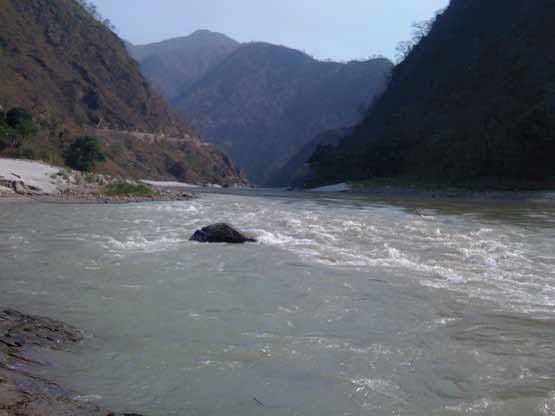/topics/ecology-and-environment
Ecology and Environment
Confessions of an OD boy: The need to achieve a sustainable open defacation free intervention
Posted on 24 Dec, 2011 07:58 PMAuthor: Mohanasundar Radhakrishnan
International training workshop on "Environmental Statistics for Professional", IIT, December 27-30, 2011, Mumbai
Posted on 19 Dec, 2011 09:04 AMOrganizers: Indian Institute of Technology (IIT), Bombay
Thadomal Shahani Engineering College (TSEC), Mumbai
Venue: Thadomal Shahani Enginnering College, P G Kher Road, Off Link Road, Bandra (West), Mumbai
![]()
![]()
Description:
IIT Bombay is organising Workshop on "Environmental Statistics for Professional" jointly with TSEC, Mumbai.
The objective of the proposed Four Day Training Workshop on Environmental Statistics is aimed at familiarizing the teaching community on the application of appropriate statistical techniques, exclusively to environmental systems. The faculty will demonstrate application of various probability and statistics techniques to environmental problems. The training would hopefully help in teaching the subject at their respective Institutions, in a structured manner.
The impacts of water infrastructure and climate change on the hydrology of the Upper Ganges river basin – A research report by IWMI
Posted on 18 Dec, 2011 07:03 PM The Ganges river system originates in the Central Himalayas, and extends into the alluvial Gangetic Plains and drains into the Indian Ocean at the Bay of Bengal. In the upstream mountainous regions, hydropower is the main focus of development with mega and micro projects either under construction or being planned in both Nepal and India.
The Ganges river system originates in the Central Himalayas, and extends into the alluvial Gangetic Plains and drains into the Indian Ocean at the Bay of Bengal. In the upstream mountainous regions, hydropower is the main focus of development with mega and micro projects either under construction or being planned in both Nepal and India.
After the main river channel reaches the plains, it is highly regulated with dams, barrages and associated irrigation canals. All this infrastructure development and abstractions affects the river’s flow regime and reduces flows, which, in turn, impacts downstream water availability, water quality and riverine ecosystems. Furthermore, there are concerns that climate change is likely to exacerbate the water scarcity problem in the Ganges Basin. Therefore, modeling the hydrology of the basin is critical for estimation, planning and management of current and future water resources.
Yamuna-Elbe - A public art and outreach project at the Yamuna riverscape in Delhi launched on 5 November, 2011
Posted on 18 Dec, 2011 02:02 PMGuest post by: Amita Bhaduri
The public art outreach project was organized by the Max Mueller Bhavan in association with the Government of Delhi and the Goethe-Institut (Hamburg, Germany) as a part of the “Year of Germany in India” programme opened on 5th of November, 2011. The art exhibition which continued till the 19th of November co-curated by artist Ravi Agarwal who is also a practicing environmentalist (Director, Toxics Link) along with German artist, Till Krauser attempted to create a pulsating synergy between the Yamuna and Elbe rivers.
 Gigi Scaria’s - The fountain of purification
Gigi Scaria’s - The fountain of purification
Photo courtesy: Rocky Thongam
This is a 24 ft installation representing a four storey apartment complex that draws Yamuna water, purifies it at various levels and dispenses it from the top in the form of a fountain.
Traditional water bodies of Delhi
Posted on 18 Dec, 2011 01:56 PMSohail Hashmi, an author, film-maker, one of the founders of the Safdar Hashmi Memorial Trust (SAHMAT) and a true Dilliwala on 5 December 2011 at the India Habitat Center. The presentation woven around photographs of the city's step well
Heavy rains continue in the states of Tamil Nadu, Andhra Pradesh, Kerala - News Roundup (16th to 30th November 2011)
Posted on 14 Dec, 2011 12:14 PMThe most affected will be Tamil Nadu followed by Puducherry, Andhra Pradesh and Kerala leading to floods, overflowing of dams and damage to property. Assessments of the earthquake in Sikkim are now ready as information is finally available.
Strengthening rural livelihoods – A report by IDRC
Posted on 13 Dec, 2011 05:17 PM This report prepared by International Development Research Centre (IDRC) examines how information related constraints in poor rural areas are being overcome and how information technology is being employed to the benefit of people in South Asia.
This report prepared by International Development Research Centre (IDRC) examines how information related constraints in poor rural areas are being overcome and how information technology is being employed to the benefit of people in South Asia.
Poor people are constrained by limited access to information and poor communications technology. The research looked at the use of ‘information communications technologies’ (ICTs) in providing agricultural extension services, getting timely market price information, finding out about rural wage labour opportunities, helping rural communities to build a sustainable asset base and understanding crop diseases and soil nutrition.
The results of the research bring together rigorously tested practices and methods of applying ICTs for improving rural livelihoods. Each research study has investigated how and to what extent a specific ICT intervention made a difference. Together it shows how ICTs have empowered rural people and transformed livelihoods in agriculture: by filling information gaps, raising awareness, building skills and extending social networks.
The focus was on agricultural communities, as Asia’s poor and middle-income countries have primarily agriculture-based economies. However, a broader ‘livelihoods’ approach has been taken to ensure that we observe the variety of ways ICTs can have an effect on rural communities. The scope of the research took into account the range of on-farm and off-farm productive and reproductive activities that support farming households and communities.
Performance audit of food security schemes in Orissa and Uttar Pradesh – A report by Centre for Environment and Food Security
Posted on 13 Dec, 2011 04:55 PMThe schemes covered under this audit include, (a) Public Distribution System (PDS), (b) Antyodaya Anna Yojana (AAY), (c) Mid-day Meals (MDM), (d) Integrated Child Development Services (ICDS), (e) National Old Age Pension Scheme (NOAPS), (f) National Family Benefit Scheme (NFBS), (g) Annapurna, (h) National Maternity Benefit Scheme (NMBS), (i) Swarnajayanti Gram Swarozgar Yojana (SGSY), and (j) National Rural Employment Guarantee Scheme (NREGS).
The Mullaperiyar dam debate - An issue of safety versus rights?
Posted on 12 Dec, 2011 10:40 AMThe issue that has been making headlines in the last few days has been that of the continuing debate between the states of Kerala and Tamil Nadu over the Mullaperiyar dam. This debate has opened up a number of issues related to the ownership and use of water between the two states of Tamil Nadu and Kerala in the context of the current changes and the loss of relevance of the laws and decisions made during the colonial rule; the water sharing, irrigation and power generation needs of both the states; and the recent concerns on the safety of the dam in Kerala versus the urgent irrigation needs of the agricultural sector in Tamil Nadu.
A view of the Mullaiperiyar dam on Kerala-Tamil Nadu border at Kumili.Photo: Vibhu
Image Source: The Hindu
This article sheds light on the history of the Mullaperiyar dam and the background for the current deadlock between the two states over the dam. The current deadlock between the two states over the dam is essentially not a dispute for water, but has its roots in the colonial times, and has to do with the need to come to terms with the agreements and decisions made in those times with changing economic, political and environmental contexts and concerns about the safety of the dam in Kerala versus the irrigation needs of the farmers in the state of Tamil Nadu.
24th Kerala Science Congress, KSCSTE & Rubber Board Government of India, January 29-31, 2012, Kottayam
Posted on 11 Dec, 2011 06:06 PMOrganizers: Kerala State Council for Science Technology and Environment Government of Kerala (KSCSTE)
Rubber Board Government of India, Kottayam
Venue: Rubber Board P.O., Kottayam





